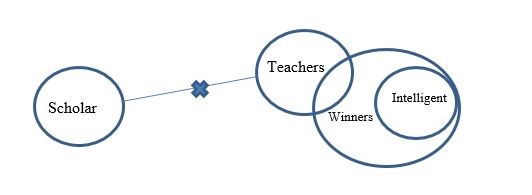Question
Statements : All intelligent are winners. Some
winners are teachers. No teacher is a scholar. Conclusions:I. Some winners are not scholars. II. No scholar is a teacher. III. Some intelligent are not teachers. In each of the questions below are given three statements followed by three conclusions numbered I, II and III. You have to take the given statements to be true even if they seem to be at variance with commonly known facts. Read all the conclusions and then decide which of given conclusions definitely does not follow logically from the given statements disregarding commonly known facts.Solution
Some winners are teachers(I) + No teacher is a scholar(E) ⇒ Some winners are not scholars (O). Hence conclusion I follows. No teacher is a scholar(E) ⇒ Conversion ⇒ No scholar is a teacher(E). Hence conclusion II follows. All intelligent are winners(A) + Some winners are teachers(I) ⇒ No conclusion. Hence conclusion III does not follow. ALTERNATE SOLUTION: Minimal possibility: 
What is the expected percentage of power generation from renewable sources in India's energy mix for the power sector in 2030, according to the Central ...
According to the data provided by the Reserve Bank of India, bank loans to the services sector grew to _____ in April-December 2022 .
Which organizations have signed a three-year partnership to skill 500,000 entrepreneurs and take digital skills to the grassroots in India?
In the 2025 State Mining Readiness Index, which three states topped Category A (mineral-rich states)?
Palkhi Festival, which lasts for 22 days, starts in the month of Jyestha (June). Every year on the eleventh day of the first half of the month of Ashadh...
Which two coal mines in India are ranked among the world's 10 largest?
Border Security Force’s commemorated its ____ Raising day on 1 December 2021.
To facilitate informed decision making by investors, markets regulator SEBI has decided to introduce a risk disclosure framework for individual traders ...
The eMobility Simulation Lab will have the latest tools along with financial support from Altair & will carry out other e-mobility labs for batteries,...
Under the “Economic Assistance Scheme”, India delivered almost 50 buses to which of these countries on its 75th Independence Day?



